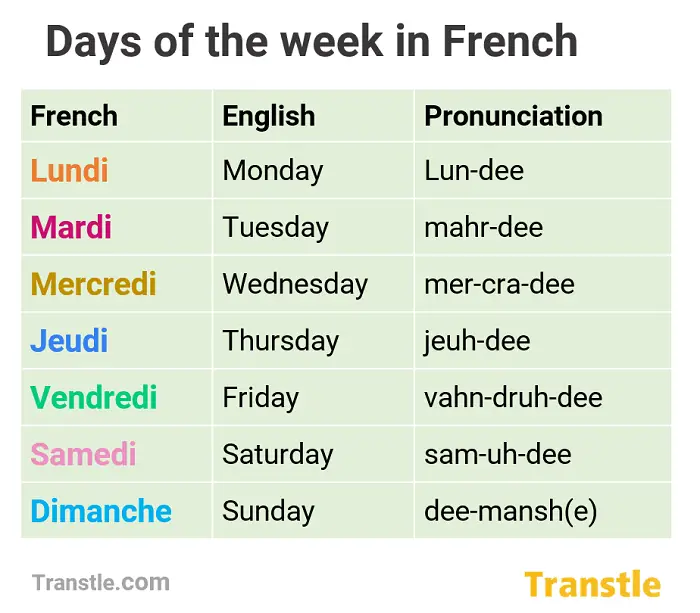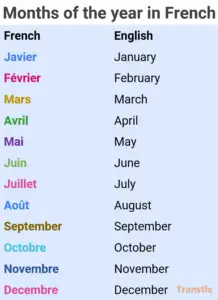Days of the Week in French With Examples and Pronunciation

Days of the week in French
The days of the week in French are basic words and part of the vocabulary used every day. Knowing them is essential for getting by in the language. There are seven days of the week, and in French they are: Lundi, Mardi, Mercredi, Jeudi, Vendredi, Samedi, and Dimanche.
In addition to learning the vocabulary, it’s important to understand the grammatical rules associated with these days, such as how to use articles and prepositions correctly.
| French | English | Pronunciación |
| Lundi | Monday | Lun-dee |
| Mardi | Tuesday | Mardi |
| Mercredi | Wednesday | mer-cra-dee |
| Jeudi | Thursday | ju-dee |
| Vendredi | Friday | von-dra-dee |
| Samedi | Saturday | sa-mey-dee |
| Dimanche | Sunday | dee-mansh |
| French | English |
| Jour (m) | Day |
| Semaine (f) | Week |
| Jours de la semaine | Weekdays |
| Date (f) | Date |
Grammar rules
- The days of the week in French are written with lower case.
|
- To express what day it is, you say c’est followed by the day.
|
- Use the definite article “Le”
When indicating that an event will take place or has taken place on a specific day in French, it’s important to use the definite article “le” (meaning “the”) because “jour” (meaning “day”) is a masculine noun. For example:
|
Using “le” with the days of the week is a fundamental aspect of French grammar. In fact, it’s common to use “le” with other time expressions as well, such as “le matin” (in the morning), “le soir” (in the evening), and “le weekend” (on the weekend).
Other time expressions
| French | English |
| Week-end (m) | Weekend |
| Aujourd’hui | Today |
| Demain | Tomorrow |
| Après demain | Day after tomorrow |
| Avant-hier | The day before yesterday |
| Le jour suivant | The next day |
| Le jour d’avant | The previous day |
| Le dernier jour | The last day |
| Matin (m) | Morning |
| Midi (m) | Noon |
| Nuit (f) | Evening |
| Minuit (m) | Midnight |
Sentences or examples
|
Quiz and exercises
Here are some sample quiz questions and exercises for you to practice what you learned.
Quiz
- What is the French word for “Sunday”?
- How are the days of the week written in French?
- Do the days of the week in French begin with a capital letter?
- How do you say “It’s Wednesday” in French?
- What definite article is used before the days of the week in French?
Exercise
Translate the following sentences from English to French, using the days of the week provided:
- Today is Monday.
- The meeting is on Thursday.
- I have a class on Wednesday.
- We’re going out on Saturday.
- I don’t work on Sundays.
Answers
Quiz
- “Dimanche”
- The days of the week in French are: Lundi, Mardi, Mercredi, Jeudi, Vendredi, Samedi, and Dimanche.
- No, the days of the week in French are written in lowercase.
- “C’est mercredi.”
- The definite article “Le” is used before the days of the week in French.
Exercise
- Aujourd’hui, c’est lundi.
- La réunion est le jeudi.
- J’ai un cours le mercredi.
- Nous sortons le samedi.
- Je ne travaille pas le dimanche.
Read next



